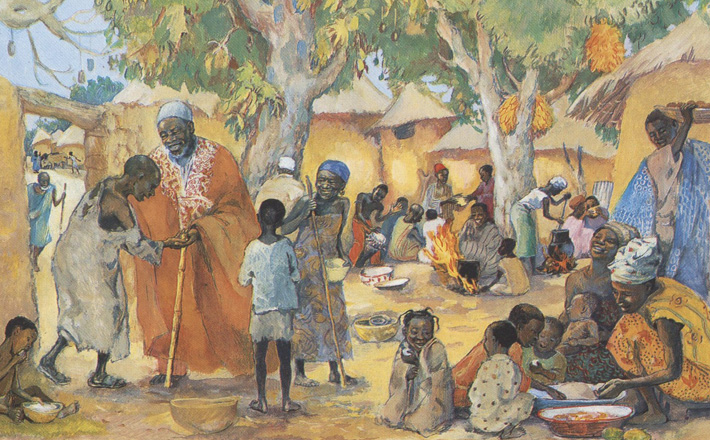Commentary on Proverbs 25:6-7
This brief reading appears in a collection of instructions that seems in large part directed to courtiers.
Here we find instructions about decorum of speech, handling conflict, and maintaining one’s honor and reputation. The collection bears the superscription, “These are other proverbs of Solomon that the officials of King Hezekiah of Judah copied” (25:1–29:27). The verses surrounding our text focus on staying out of trouble when in the presence of the king: Do not question the king’s wisdom (verses 2–3); do not be drawn into corrupt schemes at court (verses 4–5); do not be hasty exposing others’ misdeeds lest you misstep and bring shame upon yourself (verses 8–10).
In sum, hold your tongue, keep your nose clean, and don’t meddle — all good advice for those climbing the ladder of success at court. The admonition in verses 6–7 to avoid self-assertion and presumption at the royal court suits its context. In essence it advises courtiers to keep a low profile for it is better to be lifted up than put down.
Humility and Exaltation — which Lord do You Serve?
Jesus’ advice for attending a wedding banquet in Luke 14:7–11 bears a striking similarity to the advice in Proverbs. The two are, however, distinctive. The setting in Proverbs is the royal court and the motive for humility is to achieve honor and avoid embarrassment before the nobility.
While Jesus’ story is set in humbler circumstances — a wedding banquet — it alludes to a much more exalted setting, the eschatological banquet in the kingdom of God. The secondary reference is clear from Jesus’ use of the passive form in his summary at the end of his teaching. “For all who exalt themselves will be humbled, and those who humble themselves will be exalted,” denotes God’s action and thus ultimate shame and honor before God (Luke 14:11; cf. 18:14; Matthew 23:12).
Preaching Proverbs 25:6–7 as good advice for surviving in a competitive work environment is no doubt relevant to modern congregants, but in light of the New Testament’s repeated call to radical humility such a proclamation appears superficial. The kenosis of the Messiah king is the model for Christian behavior (Philippians 2:3–11) in every setting, and the hope of exaltation shifts from time to eternity, from human honoring to exaltation by God.
Those who will be invited by God to the head of the table are not those who merely practice a utilitarian kind of humility before the king, but those who serve one another, care for those who endure the ultimate social shaming of imprisonment and torture, and accept the status of “the least of these.”
Dietrich Bonhoeffer notes, “Being a Christian is less about cautiously avoiding sin than about courageously and actively doing God’s will.” Christian humility must exceed that of the courtier’s careful calculations in both motive and degree, but it yields exaltation far greater than any human can bestow.
The question to put before the modern Christian who hears Proverbs 25:6–7 is this: Who is the king that you serve? Before whom do you seek honor? Are you willing to seek places of humble service until that day when the heavenly king says to you, “Come up here, good and faithful servant… For all who humble themselves will be exalted”?


September 1, 2013